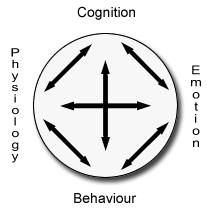On This Page...
Private Counselling for Men.
Let’s get one thing clear: you’re not a fuck-up, a wimp, kind of sissy or a loser for thinking about counselling.
It can take a hell of a lot of courage to walk into the counsellor’s reception, ready to work through life’s tough crap with an experienced counsellor like Dean Richardson.
Counselling isn’t all tears, emotions and talking about failure. Many men thinking about counselling are happy to learn that Dean Richardson works in a kind of partnership with them to help them find (re)solutions that work for them.
After all, whilst there’s still truth in the phrase: “Men Think, Women Feel”, counselling for men is about finding new stuff that works – when it hasn’t been working well lately.
Skip to “Why Men Choose Counselling“.
Now available directly in Hampshire: Counselling for Men (Havant)…
Where a man can be himself.
When we have life’s crap to work though, sometimes what society expects of us men can be just too much.
We need a break.
Counselling can be a place where, for 50-minutes weekly, a man can be himself, work through some stuff, go home.
Meeting with a counsellor, a man doesn’t have to cater for other people’s needs. He doesn’t have to remember to bring flowers home for an anniversary. He doesn’t have to be politically correct. Sometimes, a man needs a place where he can give up the macho appearance expected of him for a bit.
Think, Feel, Behave, Somatise.
Let’s look at a DIY problem. You’ve got something to fix on the wall, and it’s not easy. As a man you might look at the problem & consider your options (‘thinking’). You might thining creatively, sketch something out on paper, and use this to put a plan in place, noting problems to get over step by step. You might execute this plan, manage contingencies if things go a bit Pete Tong along the way. When finished, you step-back and look on your achievement with pride.
Unless you hit your thumb with the hammer, you didn’t involve ‘feelings’ with this approach (other than that final sense of achievement).
Counselling can look at matters from four perspectives:-

- Thinking: rational stuff that goes through our minds (planning lunch, negotiating at work, ).
- Feeling: emotional stuff that runs through our body (eg rage, love, excitement, being turned on).
- Behaviour: the stuff we do automatically (driving the car without noticing how we arrived).
- Somatic: the stuff our mind does to our body (eg making us look and feel like we’re sick with the flu, which suddenly clears up after 24 hours but which coincidentally got us out of a sticky situation),
So with all these options… we can see that effective counselling can take approaches that focus on several matters (not just feelings).
Counselling Tools for Men.
Let’s face it – we’re just plain old blokes.
Historically, we went out and killed boars to feed our family. We didn’t need to understand things from the boar’s perspective.
So today, some of us can be left a bit clueless as to why our partner has gone off in a huff, why the kids are playing up, why the boss is being a pain, why we can’t sleep at night, why sometimes we get addicted to bad stuff and why sometimes we get these irrational behaviours resulting in sweats, palpitations and heavy breathing (sometimes called a ‘panic attack’).
So, you might be interested in the following facts:-
|
|
Dean isn’t the kind of counsellor who sits in total silence, who asks you to waft scarves in the air, paint pictures, or makes you talk about stuff that’s really non-of-his-business.
It’s pretty much two men, sat in chairs, having a conversation… but with a specific & helpful purpose.
Why Men choose Counselling.
Let’s face it – you’re intelligent. You have an interest in learning what’s going on for you. Why would you be reading this page if not?
Anger/Rage Comprehension.
Not anger management as such; rather we’ll treat your anger as being a form of communication… a form of acting out something that can’t (yet) be understood or expressed in words. We’ll try to learn what fuels your rage in order to loosen its grip over you and to give you some choices in your behaviour.
Violence: Acting-out by hitting/breaking stuff.
If physical behaviour is causing problems (harming you or others) we’ll work out ways to help you continue to be angry, but without hurting.
Bullying.
Whether being a bully, or on the receiving end of a bully, we’ll talk about what’s behind the behaviour and how to bypass & interrupt the bullying process.
Sexual abuse.
Not all men came through childhood intact. Sometimes, the abusers still live-on in our heads long after the abuse has stopped. These unresolved matters may influence our lives, trying to find ways to become resolved, and sometimes doing so by trying to recreate in the present the abuse from our pasts.
Relationship Comprehension.
Assistance in helping you understand what might be going wrong in your marriage/partnership… and if you can do something to change things.
Gender Identity.
Understanding about how some thoughts, feelings and behaviour might be something else than what men “are supposed to think/feel/do”. Quite different from male-to-female (MTF) and female-to-male (FTM) gender reassignment, and sometimes related.
Depression.
We’re blokes. We get up, work, achieve goals, go home. When something knocks us off our feet we call it MAN FLU! So when depression kicks in many of us don’t know what it us, what’s causing it or how to resolve it.
Taking anti-depressants can mask the symptoms, but doesn’t seem to address the cause.
Sexual confusion.
Have you noticed the number of ‘modern’ men who seem to have no problem about their fluid-sexuality? It seems that every week some famous person is expressing a sexuality that’s non-standard. Or is it non-standard? You can talk with me about any sexual confusion you may have to help you understand, come to terms, and find peace.
Differences between emotions and thoughts.
As blokes, we tend to ‘act’ and ‘think’. Many of us tend not to ‘feel’. Although, as society grows up around us, understanding those emotional kind of things can be dead handy too.
Business Behavioural Skills.
Corporate workplaces can take stress to the limit. It appears that only those who work 24/7/365 make it to the top. We’ll can talk about how we make you appear to be a 24/7 worker, whilst keeping your mental fuel-tank refuelled.
Dealing with relationships (professional and personal).
We can talk about why your best mates always seem to end up telling you to ‘fuck off’, or why each of your relationships keep changing [leading to them ending] after a few months, or why it’s harder for you to just get along with those people who seem to have so much baggage nowadays.
Most importantly… confidentiality: the stuff you wouldn’t talk about with your mates is the stuff you can talk with me about.
My Guarantee to Men.
I have worked with many men in counselling. You won’t be surprised that several of them were sceptical (“my wife/girlfriend told me to come”, “I don’t understand why life is so shit”, “how can you help?”).
But you see: counselling isn’t done to you. It’s a partnership between therapist and client that makes it work.
Since 1999 I have worked with countless men in counselling – and all of them got something out of the experience to varying degrees.
Meet with me for just one session…
… and then make up your mind about me.
- I’ll also promise that I won’t sit for 50 minutes in silence (or just saying ‘hmmm’) and that I will answer your questions (though, to help you, it may not always be in a way that you’d expect in a, say, social situation).
- I won’t fuck around with your head, and I won’t do anything to you that makes you think ‘shit, there was no need to say that!’ (at least not at the beginning until we’ve built a respectful working partnership).
- I won’t put words into your mouth (even a counsellor can be told to “I don’t want to talk about that” if there’s stuff you don’t want to talk about – I won’t be offended) and I won’t make you feel as though you’re mental, or anything less than the man you are.
- I won’t even call out your name when I meet with you in reception (I’ll protect your privacy).
What I will do is:-
- I’ll take some contact details and ask some questions to get a sense of how you respond (this helps me reword things so that they’re better used by us both).
- I’ll give you the time to tell your story in your own way. I may prompt you occasionally with things I don’t understand.
- We’ll talk about if we were to meet again, what sort of work would we do so that, after some sessions, you wouldn’t need to keep coming back to counselling again (we would have worked through the problem).
In the end, you’ll leave with a personalised ‘tookit’ that we built together and which you can use on your own… and we’ll have stuck a plaster over the wounds you came in with.

